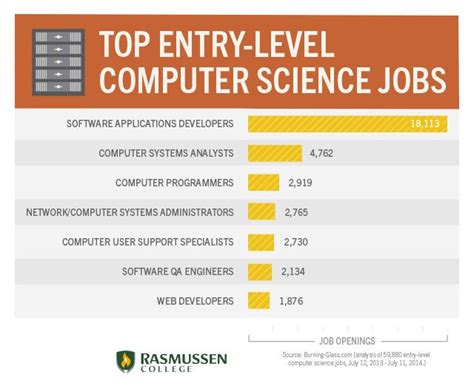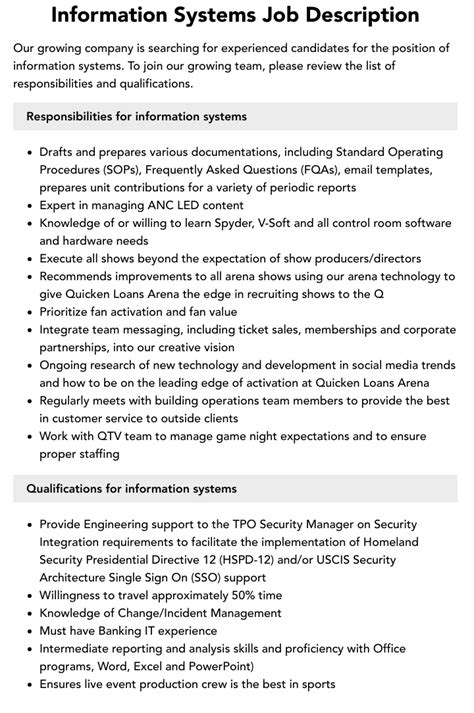Computer Information Systems Careers

The field of Computer Information Systems (CIS) is a dynamic and ever-evolving domain that offers a multitude of career opportunities for those with a passion for technology and its application in various industries. From designing innovative software solutions to managing complex information networks, CIS professionals play a crucial role in shaping the digital landscape. This comprehensive guide will delve into the diverse career paths within CIS, shedding light on the skills, education, and pathways to success in this exciting field.
Understanding Computer Information Systems

Computer Information Systems encompass the study and application of technology to manage and process information. It involves the integration of computer systems, software, and networks to facilitate data management, communication, and problem-solving within organizations. CIS professionals are skilled in both technical and business aspects, making them invaluable assets in today’s digital economy.
The demand for CIS experts is evident across industries, from healthcare and finance to e-commerce and entertainment. Their expertise lies in understanding the intricate relationship between technology and its real-world applications, ensuring efficient and secure data handling.
Educational Pathways to CIS Careers

Pursuing a career in Computer Information Systems typically begins with a strong educational foundation. Here’s an overview of the academic paths that lead to CIS careers:
Bachelor’s Degree in CIS or Related Fields
A Bachelor’s degree in Computer Information Systems, Computer Science, or Information Technology is a common starting point. These programs provide a comprehensive understanding of computing principles, programming languages, database management, and network administration. Students often engage in practical projects and internships to gain hands-on experience.
Specific CIS degree programs may offer specializations such as Cybersecurity, Software Engineering, or Data Analytics, allowing students to tailor their education to their career interests.
Relevant Associate Degrees and Certifications
For those seeking a more focused and accelerated path, Associate degrees in CIS or Information Technology can be valuable. These programs often cover core CIS concepts and may offer specialized tracks like Network Administration or Web Development. Additionally, industry-recognized certifications like CompTIA A+, Network+, or Cisco certifications can enhance employability and demonstrate practical skills.
Master’s and Advanced Degrees
Individuals aiming for leadership roles or research positions in CIS may opt for Master’s degrees or PhDs. Advanced degrees provide in-depth knowledge and the opportunity to specialize in areas like Artificial Intelligence, Cybersecurity, or Information Systems Management. These programs often attract professionals seeking to advance their careers or transition into academia.
Career Opportunities in CIS
The diverse nature of Computer Information Systems opens up a wide array of career paths. Let’s explore some of the most prominent roles and their responsibilities:
Software Developer
Software Developers are at the forefront of creating innovative software solutions. They design, develop, and test software applications, often working closely with clients or internal teams to understand their specific needs. Skills in programming languages like Java, Python, or C++ are essential, along with an understanding of software development methodologies.
| Responsibilities | Skills |
|---|---|
| Designing and coding software | Programming languages, Software architecture |
| Conducting code reviews | Debugging, Version control |
| Collaborating with stakeholders | Communication, Problem-solving |

Network Administrator
Network Administrators are responsible for the smooth operation of computer networks within organizations. They ensure network security, monitor performance, and troubleshoot issues. Skills in network protocols, firewall management, and virtualization technologies are crucial for this role.
| Key Responsibilities | Technical Skills |
|---|---|
| Network setup and maintenance | Networking fundamentals, VPN |
| Security implementation | Firewall configuration, Encryption |
| User support and training | Help desk software, Active Directory |
Database Administrator
Database Administrators manage and maintain organizations’ critical data. They ensure data integrity, optimize database performance, and implement security measures. Proficiency in database management systems like MySQL, Oracle, or SQL Server is essential, along with skills in data modeling and query optimization.
| Role Overview | Technical Expertise |
|---|---|
| Database design and implementation | SQL, Database architecture |
| Backup and disaster recovery | Data backup strategies, Data recovery |
| User access control | Database security, User authentication |
Information Systems Manager
Information Systems Managers oversee the strategic planning and implementation of technology within organizations. They lead teams, manage budgets, and ensure that technology aligns with business goals. Strong leadership, project management, and communication skills are essential, along with a deep understanding of IT infrastructure and business processes.
Cybersecurity Specialist
With the increasing importance of data security, Cybersecurity Specialists play a critical role in protecting organizations from cyber threats. They implement security measures, conduct risk assessments, and respond to security incidents. Skills in network security, cryptography, and incident response are vital for this high-demand career path.
| Specialist Duties | Technical Proficiency |
|---|---|
| Threat detection and prevention | Firewalls, Antivirus software |
| Security policy development | Network security protocols, Access control |
| Forensic analysis | Digital forensics, Encryption techniques |
Skills and Competencies for Success
Beyond technical skills, Computer Information Systems professionals must possess a range of soft skills to excel in their careers. Here are some key competencies:
- Problem-Solving: The ability to analyze complex issues and develop effective solutions is essential in CIS.
- Communication: Clear communication ensures effective collaboration with colleagues and clients.
- Adaptability: The CIS field evolves rapidly, requiring professionals to adapt to new technologies and methodologies.
- Project Management: Managing projects efficiently is crucial for successful technology implementations.
- Attention to Detail: Precision is vital when working with code, networks, or databases.
Conclusion

Computer Information Systems offers a plethora of exciting career opportunities, each with its unique challenges and rewards. Whether you’re drawn to software development, network administration, or cybersecurity, a career in CIS promises a rewarding journey of technological innovation and impact. With the right education, skills, and passion, the possibilities are limitless.
What are the entry-level jobs in CIS for recent graduates?
+Entry-level jobs in CIS for graduates include positions like Junior Software Developer, Network Technician, Help Desk Analyst, or Data Analyst. These roles provide valuable experience and a foundation for future growth.
How can I stay updated with the latest CIS trends and technologies?
+Staying updated involves continuous learning through online courses, attending industry conferences, following tech blogs and podcasts, and engaging with professional networks. Regularly reading reputable tech publications also keeps you informed.
What are some common challenges faced by CIS professionals?
+CIS professionals often face challenges like keeping up with rapid technological changes, managing complex systems, and ensuring data security. Additionally, effective communication and collaboration with non-technical stakeholders can be a hurdle.



